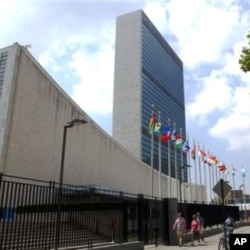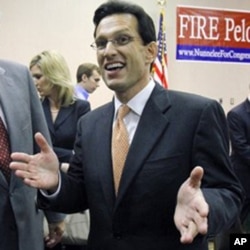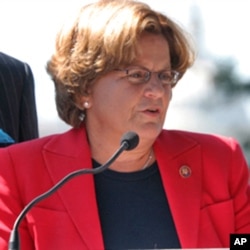A number of political analysts are looking at what to expect when Republicans assume committee chairmanships.
One of them is Brett D. Schaefer, a fellow at the Heritage Foundation's Margaret Thatcher Center for Freedom. He foresees cuts in discretionary spending -- programs where spending is not mandatory but is determined each year by Congress.
Schaefer says many of the expected cuts will come in the budgets of programs and groups – including the United Nations and U.S. State Department – that do not have strong domestic constituencies to defend them.
"There has been talk about reducing spending to 2008 levels," he says. "That would imply an immediate reduction across the board, but I would also expect a more conservative House (of Representatives) to scrutinize funding for foreign aid and international programs in general, as they have been more skeptical and critical of those types of programs than Democrats traditionally have been."
Some of the cuts could be made by the State and Foreign Operations Appropriations Subcommittee in the House, which determines funding for the State Department, USAID and programs involving foreign aid and humanitarian assistance.
In line to assume the chairmanship of the subcommittee is Congresswoman Kay Granger of Texas. The Washington Times newspaper says she is a strong supporter of a balanced budget amendment and a critic of development aid going to countries that she says have not done enough to control corruption.
Another Republican leader seen as likely to suggest spending cuts is incoming House majority leader Eric Cantor. He has linked foreign aid to a country’s support for U.S. foreign policy objectives. He has also proposed reducing foreign assistance, except for aid to Israel.
That drew comment from J. Stephen Morrison, director of the Global Health Policy Center and senior vice president at the Center for Strategic and International Studies in Washington.
"[Cantor] made a motion just before the (midterm elections) calling for separating out the foreign aid contribution to Israel from the rest of the foreign aid budget<' says Morrison.
"It was very controversial. I don’t know that it has much support among Republicans. I think that was a trial balloon. That was a pretty radical measure, which shows there is at least some deliberation around how foreign assistance might be rethought and restructured in this period."
Traditionally, U.S. conservatives have not favored large reductions in defense spending, though pressure by tea party activists, representing popular support for cutting the national budget, could lead the Congress to reconsider the issue.
Christopher Preble, the director of foreign policy studies at the Washington-based CATO Institute, explains the position of those who say no aspect of the budget should be spared:
"[Many] conservatives believe that because defense is a core function of government, they are less inclined to focus there than on other domestic spending, which they see as beyond that core function," says Preble.
"But many genuine fiscal conservatives understand that when you have a department that has grown as quickly and steadily as the Department of Defense over the last 12 or 15 years, there is clearly some waste in there and some opportunities for cost savings even without a fundamental change to the strategy.…And, there are even some...who – not wanting to burden the troops with additional obligations and fewer resources -- are willing to revisit some of those global (military) commitments made years ago and have sustained mainly by inertia.
"There is no core conservative argument that says the U.S. must maintain a global military presence and sustain nation building missions in Iraq and Afghanistan indefinitely. Unlike on domestic and fiscal policy, where there is much more agreement, many of these foreign policy questions will turn on a more individual basis [of the committee and subcommittee chairs]. “
The new Republican majority will not just be considering budget cuts. They’re also likely to exercise their oversight responsibilities – allowing them to challenge Obama administration policies.
Congresswoman Ileana Ros-Lehtinen is the incoming chair of the House Foreign Affairs Committee.
Ros-Lehtinen is a strong supporter of President Obama’s “surge” policy in Afghanistan and of strong enforcement of sanctions against Iran. She’s also a strong supporter of human rights in China and Russia and is critical of the administration’s efforts to relax parts of the U.S. embargo against Cuba. The congresswoman also disagrees with the administration’s decision to re-join the U.N.’s Human Rights Council and has backed legislation to reduce financial support to the international body.
J. Peter Pham is senior vice president at the National Committee on American Foreign Policy in New York City. One of the issues he’s following is development assistance. Pham notes that California Congressman Ed Royce is in line to become chairman of the House Foreign Affairs Subcommittee on Terrorism, Nonproliferation and Trade. Royce is a former chair of the House Subcommittee on Africa and Global Health.
Pham says Royce is likely to use the committee to assess the behavior of countries receiving funding from the Millennium Challenge Corporation, the MCC, which provides development assistance to countries with good records of economic and political governance. According to Pham, some say the corporation has veered away from its own strict standards and some member countries undermine U.S. foreign policy.
"We have on the record," he says, "both Mr. Royce and (Texas Congresswoman Kay) Granger expressing formally in hearings and in correspondence with the administration their reservations about the 540 million dollar [agreement] signed with Senegal. [This], at a time when the Senegalese president was building a 25 to 75 million dollar bronze statue with the North Koreans and appointing his son to head a ministry that includes international cooperation, transportation, aviation, regional planning and energy.
"One of the disturbing things I’ve written about is Senegal’s slow but sure creeping alliance with Iran. That, and the corruption in government, is something Mr. Royce undoubtedly is going to look into much more closely."
Pham says that with the exception of some highly contentious issues like the wars in Iraq and Afghanistan, U.S. foreign policy is, as he puts it, heavily bi-partisan, a trend he expects to continue in the new Congress. In his view, the only difference now, with Republican control of the House, will be an increase in oversight.
Without that, he says, approval of programs and expenditures becomes routine, and questionable projects could be approved. Conservatives say that’s the opposite of the message sent by an electorate concerned with government belt-tightening.















